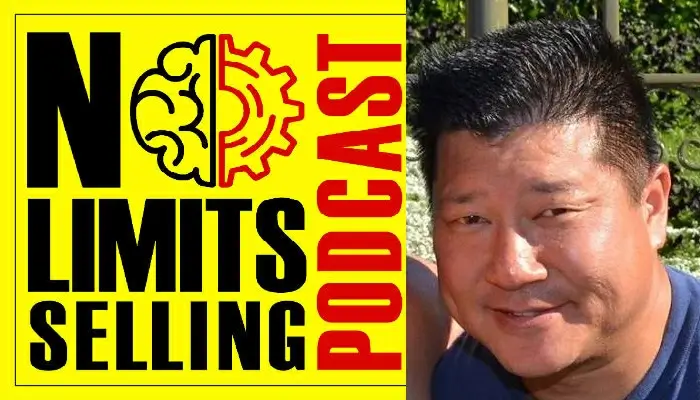
How To Achieve Sales Success by Transforming Mindsets
With a professional B2B sales career that commenced in the mid-1990s, Rao Wu has since ascended through a range of mid-level and senior-level executive management roles. His leadership acumen and strategic prowess have been instrumental in contributing to over $400 Million in total acquisitions and a successful IPO.
Today, Rao stands as a testament to the power of effective leadership, with many of his former sales personnel now occupying roles as managers, Directors, and VPs, and some even founding their own companies. Currently, Rao is at the forefront of the Digital Identity industry, continuing to innovate and lead in his field. His journey underscores the transformative power of leadership and the potential for success in the evolving digital landscape.

Contact Rao:
[EDITOR’S NOTE: This podcast is sponsored by No Limits Selling. It is a fun, fast-paced podcast that delivers hard-fought business advice that you can implement today to improve your sales and performance]
Interested In Our Real Estate Coaching Services? Explore Our Website: Link
Feeling Not Well Today? You Can Use Our Mindset Boosters App To amp Up Your Mood: Link
Find us on Social Media:
LinkedIn | Facebook community | Instagram
Like what do you listen to? Subscribe to our podcast!
Ready to become fearless? We can help you become fearless in 60 days so you accomplish more in your career Schedule A 15 min Call with Umar
Summary
In a riveting discussion, Rao Wu, a seasoned sales leader, shares his insights on the subtle yet significant differences between A and B players in a company, the importance of individualized management, and the role of mindset in performance and sales success. This conversation, reminiscent of the engaging and informative style of The Guardian, Business Insider, and CNBC, provides valuable lessons for anyone in a leadership role.
The A and B Player Dichotomy
Wu begins by dissecting the often-overlooked distinction between A and B players within a company. He argues that the skillsets of A and B players are almost identical, with mindset being the primary differentiator. This perspective challenges the conventional wisdom that performance is solely a function of skill and knowledge. Instead, Wu suggests that the "little things" that B players often neglect can make a substantial difference in their performance and their transition to becoming A players.
The Art of Individualized Management
Wu then delves into the realm of management, offering advice to seasoned sales managers on how to enhance their leadership effectiveness and achieve sales success. He underscores the necessity of managing people differently, recognizing that everyone has unique ways of thinking and working. This approach, he argues, is essential for effective leadership. Wu's insights here echo the sentiment that good management is not a one-size-fits-all proposition but rather a nuanced process that requires understanding and adapting to individual differences.
The Power of Process
The conversation then shifts to the importance of having a common process in management. Wu and Hameed agree that without a shared process, identifying and addressing problems becomes a daunting task. They liken the situation to a play on Broadway, where different actors can elicit different responses from the audience, even when saying the same words. A shared process, they argue, does not strip away individuality but instead provides a framework within which individual strengths can be effective in achieving sales success.
Mindfulness and Efficiency
Wu also shares a personal "mind hack" that he uses to enhance his efficiency and effectiveness: meditation. He explains that taking time for quiet reflection, such as during daily walks, allows him to focus on specific goals or tasks. This practice, he says, often leads to epiphanies that help him overcome challenges. His approach underscores the growing recognition of the role of mindfulness in personal and professional success.
Supporting Sales Teams
Finally, Wu discusses his role in supporting sales teams by providing them with the necessary tools to succeed. He often joins sales calls to advocate for his company's product line, demonstrating his commitment to his team's success. His approach highlights the importance of active leadership and the value of providing teams with the resources they need to excel to achieve sales success.
This enlightening conversation with Rao Wu provides a wealth of insights for anyone seeking to enhance their leadership skills and understanding of sales team dynamics. It underscores the importance of mindset, individualized management, shared processes, mindfulness, and supportive leadership in achieving success.
Questions & Answers
What is the main difference between A and B players in a company according to Rao Wu?
What advice does Rao Wu give to seasoned sales managers?
Why is having a common process important in management?
What is Rao Wu's personal "mind hack" for enhancing efficiency and effectiveness?
How does Rao Wu support his sales teams?
What has been Rao Wu's contribution to his company's financial success?
What is Rao Wu's current role in the industry?
Don’t miss this opportunity to transform your real estate career with one-on-one coaching. As an experienced real estate coach, I, Umar Hameed, am dedicated to helping you unlock your full potential and achieve your real estate goals. To learn more about who am I and my clients ↓
If you’re ready to take the next step, book an appointment with me today and begin your journey toward success in the real estate industry.
